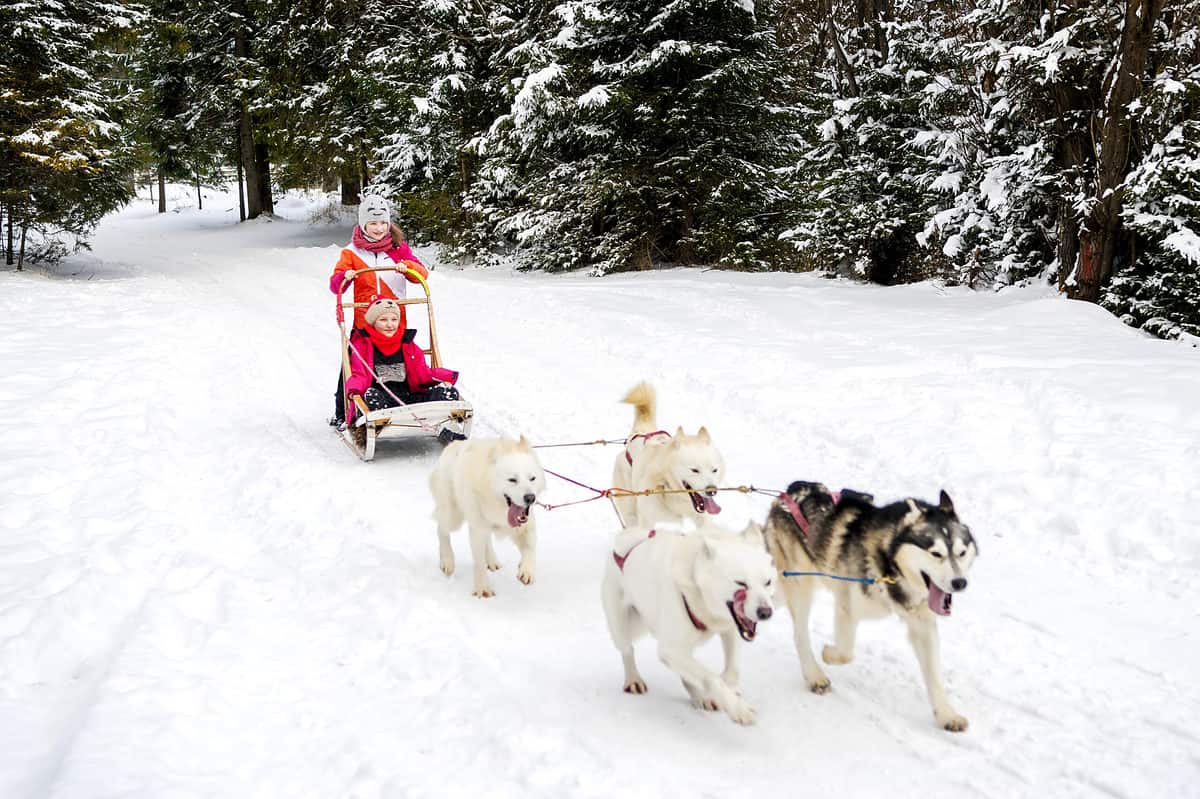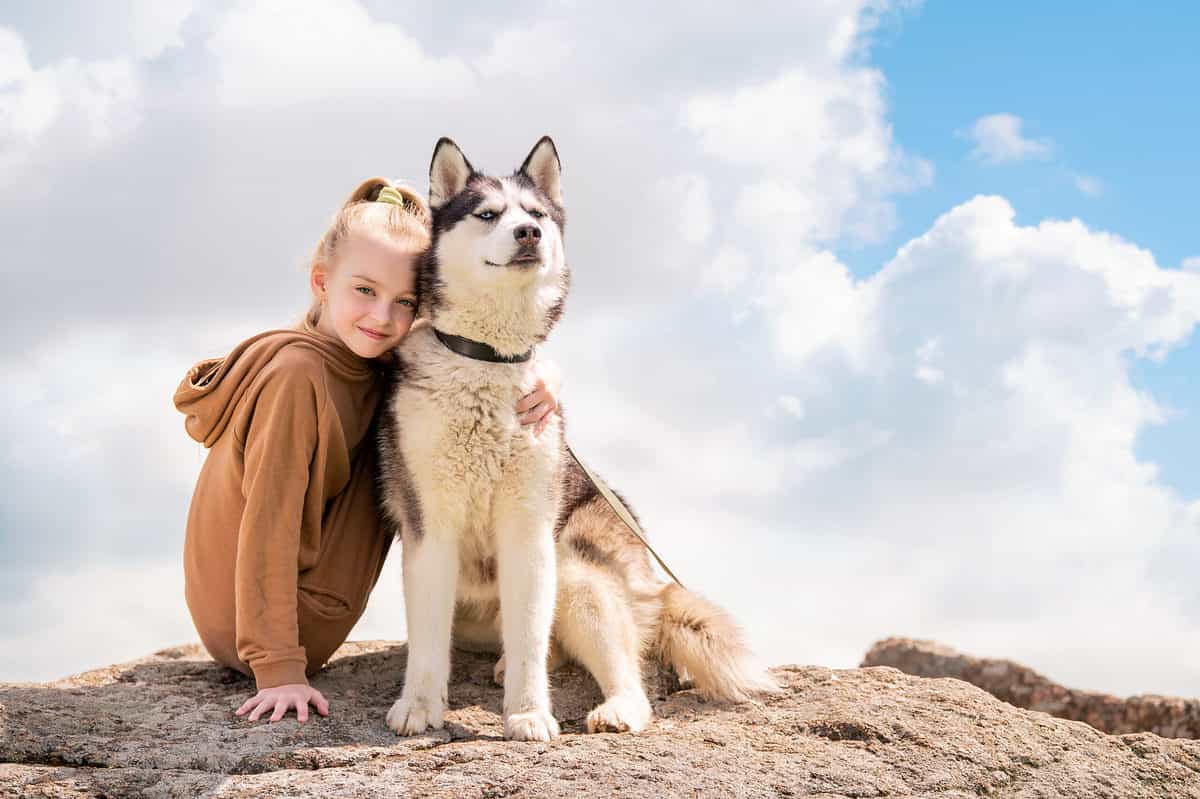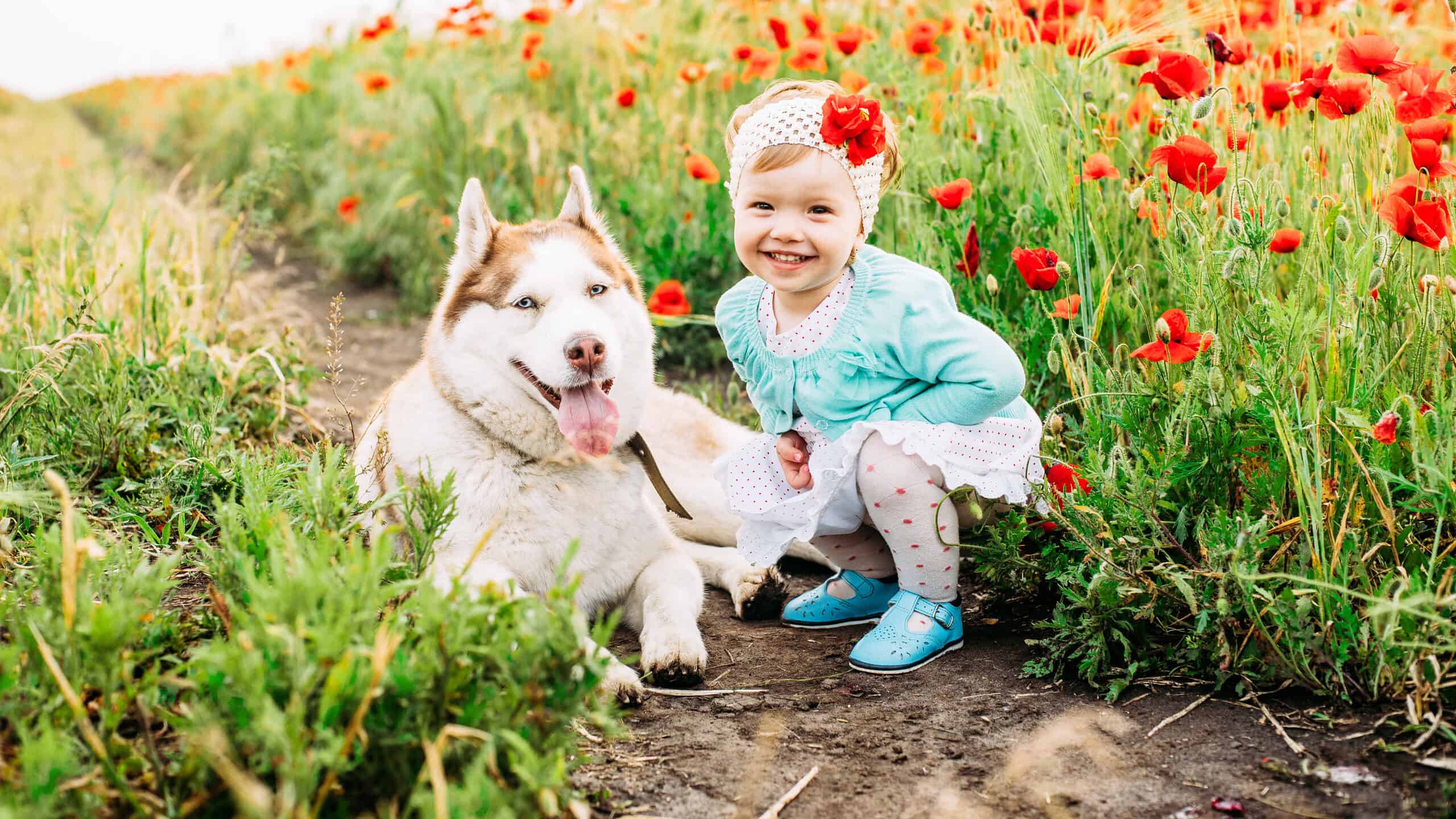The Siberian husky is a medium-sized dog that is often identified by its beautiful, thick coat, blue or multi-colored eyes, and pointed ears. It is an energetic breed, but it has a lot of love to give. With all that said, can huskies and kids mix? Today, we will share some important details about the Siberian husky, how to prepare your home for a new dog, and if you should bring a husky home to your children.
How Big Do Huskies Get?
The first consideration to make when thinking about pairing huskies and kids is their size. Huskies are considered medium-sized dogs. Both males and females can grow to between 20-23.5 inches tall at the shoulders. They also typically weigh between 35 and 60 pounds.
How Much Energy Do Huskies Have?
You have likely seen pictures of Siberian huskies in snowy climates or pulling sleds, and that is because that is what they were bred to do. They are working dogs that were designed for outdoor activities of all kinds. Because of that fact, they are known for having a lot of energy and endurance.
In order to satisfy their desire for physical activity, they require a lot of exercise and mental stimulation. Huskies need a lot more activity than many other dogs. In general, you should expect to allow them at least two hours of exercise or play every day. Some may even need more depending on their individual personality and needs. When you pair huskies and kids, consider this need for constant motion.
How to Train Huskies

Huskies requires at least 2 hours of exercise per day.
©iStock.com/Zuberka
Although they require a lot of activity, the training necessary for Siberian huskies is similar to other breeds. Like most dogs, it is a good idea to start their training early when they are puppies. That way, you can instill good habits in them earlier and prevent bad traits from forming.
Once you start training your dog, you need to be consistent and set clear rules and expectations. In order to be successful, huskies need consistency in their training to really understand what is expected of them. Training for huskies can be a bit delicate. Huskies generally respond best to training methods that are firm but gentle. That means using positive reinforcement with praise and treats whenever they follow a command.
No matter what, avoid physical force or harsh punishments during your training. Creating fear in your dog can permanently destroy the bond that you have created, and you may never be able to get it back.
If you are having trouble, then try reducing the length of the training sessions. Huskies tend to have short attention spans, so keep them short, so your dog can focus. Over time, you can make the training sessions longer.
The other important part of training your husky is to socialize them as soon as possible. Introduce your dog to other people early on. Also, bring them to the dog park and show them other animals, so they aren’t frightened by new situations.
If you find that you are losing control or your husky simply is not listening to your commands, then you may need to bring them to a professional trainer. There is no shame in doing so. A professional can provide guidance and support that can get you on the right track.
How Much Maintenance Do Huskies Require?
When you think about mixing huskies and kids, you need to think about the maintenance invoiced in caring for this breed. There are several tasks that will be required on a regular basis.
Typical Maintenance Requirements
Grooming – The unique attribute of Siberian huskies is that they have a thick double coat, and it sheds heavily twice per year. In order to keep their coat in healthy condition and to reduce shedding, regular grooming, including brushing and bathing, is essential.
Exercise – You or someone in your family will need to take time out of your schedule to walk your husky for two hours a day or let them play outside a lot. A lack of exercise could lead to boredom-related behavior problems. This is an important consideration if you have kids. If you need to split your time and you can’t allow your dog the exercise they need, then you may want to consider a more low-maintenance dog.
Nutrients – Because of their constant movement, huskies require a high-quality diet that provides the nutrients that they need.
Dental Care – Huskies can be prone to oral and dental diseases. To prevent an issue, you will need to brush their teeth regularly and bring them to regular cleanings.
Healthcare and Common Issues
It is important to bring your husky to the veterinarian regularly so they can get their vaccinations and preventative care. There are some health issues that are common to Siberian huskies, and they include:
- Eye issues, including cataracts, retinal atrophy, corneal dystrophy, and Uveodermatologic syndrome
- Hip Dysplasia
- Follicular Dysplasia (abnormal hair growth)
- Zinc Deficiency
- Hypothyroidism
Bring your husky to the vet regularly so they can look for early warning signs of these ailments and other common issues that can affect dogs of all breeds.
How Much Does it Cost to Own a Husky?
Huskies are generally one of the more expensive breeds because of their size, health needs, and required attention. Below are some of the costs that you expect. Many experts say that the cost of a husky can be between $1,000 – $5,000 per month.
Keep in mind that the annual cost will depend on the quality of the products you buy, the cost of living in your area, and other variables.
Cost of the Dog – A big chunk of your first year’s costs will be the purchase of the dog itself. The cost will depend on where you get your dog. If you adopt it from a shelter, then you can expect to pay between $50 – $500. You can also buy a husky from a breeder, but it will cost between $500 – $2000. Many people choose to go with the breeder because they can tell you the background of the dog, any health issues they may have, and answer other questions you may have.
Food – Huskies eat a lot, so you will need to feed them a lot. Depending on the quality of the food you buy, you can expect to pay somewhere between $50-$100 per month.
Veterinary Care – As mentioned, you will want to bring your husky to the vet on a regular basis for vaccinations and other preventive care. Depending on the costs in your area, you can expect to pay between $300 – $1,000 annually. You can keep your costs low by investing in a good pet insurance policy.
Grooming – Although you can do a lot of grooming on your own, you will still need to pay for the supplies and time and effort. In general, you can expect to pay around $50 – $100 per month. You may want to splurge on a professional cleaning from time to time and you can add that to the cost.
Training – If you get professional lessons or classes, then you can expect to pay about $50 – $200 per session.
Exercise and Activities – If you do not have the time to allow your husky the minimum of two hours that they need for daily activity, then you may need to hire someone to help out. That may include a professional dog walker or the costs of a doggy daycare or dog sports program. The price of these services will differ from place to place, but you should add the potential costs to your budget.
Mixing Huskies and Kids – How Old Should Your Child Be?

Kids 6 years old and beyond will do well with a Siberian Husky.
©iStock.com/Maria Moroz
Because of the huskies extreme physical needs, you need to ensure that your child is capable of dealing with a strong animal in the house. With that in mind, your kids should be at least 6 years old before you bring home a husky.
Keep in mind that your child should not be in charge of training or ensuring the safety of the husky at this age. However, it is at this time that children are better able to understand how to interact with the dog and avoid hurting it. As they get a bit older, they can assist with the training. However, until your kids reach their teen years, the parents should always supervise when they are interacting with the dog to ensure everyone’s safety.
Can Kids Be Allergic to Huskies?
When mixing huskies and kids, you should be aware that some children may experience allergies. Keep in mind that it may not be the husky itself. Many people are allergic to various breeds. Still, kids and adults can be allergic to the dog’s skin cells, urine, and saliva. Negative reactions can involve itching, sneezing, and watery eyes.
Before you bring a husky home, you should ensure that your children don’t have major allergic reactions. You can do that by bringing your child around the husky owned by a friend to see if they have a reaction. You can also bring your kids to an allergist and they can get tested.
If their allergies are mild and you really want the dog, then you can take simple precautions around the home to limit the effects. Tips include:
- Regularly groom and bathe the husky to reduce the amount of dander and hair in the home.
- Regularly dust and vacuum to remove allergens.
- Use air purifiers throughout the house.
- Have your kids wash their hands and faces after petting the dog.
- Keep the husky out of your child’s bedroom.
General Tips and Precautionary Measures
Here are some other considerations to keep in mind when you bring a husky home to your family:
Obesity Issues – Siberian huskies are also prone to obesity. If they become overweight, then it could lead to other health issues, including joint problems and digestive disorders. To avoid this issue, make sure that you give your dog the exercise it needs and avoid going overboard on treats.
Secure Your Yard – Because huskies are so energetic, they can get through flimsy fences, so ensure that you have a strong fence that will keep your husky contained.
Microchip Your Dog – If your dog is able to run away, you will need to find them as soon as possible. The best way to do that is by implanting a microchip. That way, you can find them quickly with the help of an app.
Verdict: Are Huskies Good with Kids?
In the end, although this breed is full of energy and it requires a lot of maintenance, you can generally mix huskies and kids after they reach 6 years old or beyond. If parents are around to supervise, then this breed can be nice and affectionate, but you must make sure that they get the proper amount of exercise every day, so they don’t act out. If you decide to go forward, then we wish you the best with your new furry friend.
Up Next:
- Are Goldendoodles Good With Kids? What Parents Need To Know
- Are Newfoundlands Good With Kids? What Parents Need To Know
- Are Poodles Good With Kids? What Parents Need To Know
- Are Shih Tzus Good With Kids? What Parents Need To Know
- Are Corgis Good With Kids? What Parents Need To Know
- Are German Shepherds Good With Kids? What Parents Need To Know
- Are Dalmatians Good With Kids? What Parents Need To Know
- Are Dobermans Good With Kids? What Parents Need To Know
- Are Labs Good With Kids? What Parents Need To Know
- Are French Bulldogs Good With Kids? What Parents Need To Know
- Are Belgian Malinois Good With Kids? What Parents Need To Know
- Are Pitbulls Good With Kids? What Parents Need To Know
- Are Dachshunds Good With Kids? What Parents Need To Know
- Are Rottweilers Good With Kids? What Parents Need To Know
- Are Chow Chows Good With Kids? What Parents Need To Know
The image featured at the top of this post is ©iStock.com/kurapatka
